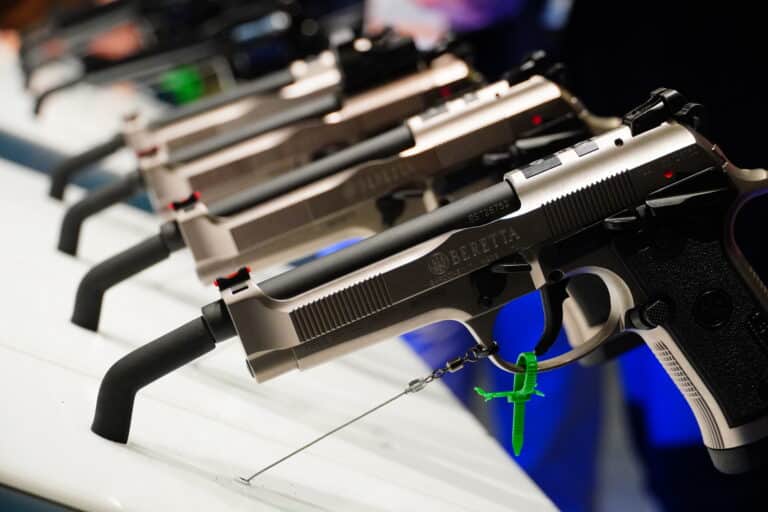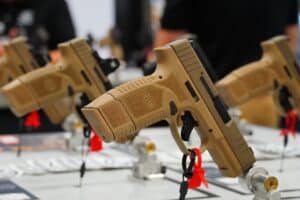Another federal appeals court has determined the Second Amendment protects the gun rights of at least some convicted felons.
On Thursday, a three-judge panel from the Ninth Circuit Court of Appeals sided with defendant Steven Duarte and vacated his conviction. They found the federal ban on felons possessing firearms was unconstitutional as applied to Duarte because his underlying convictions didn’t involve violent crimes.
“Duarte is an American citizen, and thus one of ‘the people’ whom the Second Amendment protects,” Judge Carlos Bea wrote for a 2-1 court in US v. Duarte. “The Second Amendment’s plain text and historically understood meaning therefore presumptively guarantee his individual right to possess a firearm for self-defense. The Government failed to rebut that presumption by demonstrating that permanently depriving Duarte of this fundamental right is otherwise consistent with our Nation’s history.”
The ruling deepens the federal circuit split over the constitutionality of the law that bars anyone convicted of a crime punishable by more than two years in prison from ever owning or handling firearms again. Felon-in-possession charges are the most common federal gun prosecutions in the nation. Continued disagreement over the constitutionality of the law underlying those charges may motivate the Supreme Court to address the issue itself directly, especially the question of whether people who aren’t violent present enough of a dangerous threat to be worthy of a lifetime gun ban. The history and tradition test the Court set in 2022’s New York State Rifle and Pistol Association v. Bruen has opened up new challenges to all kinds of gun laws, and the Court has yet to hand down another Second Amendment ruling, though the case it’s currently considering is likely to delve into the dangerousness question.
The Department of Justice, which defended the federal law, did not respond to a request for comment. However, it already requested that the Supreme Court review Garland v. Range, the other case in which a federal appeals court found the gun ban unconstitutional as applied to non-violent felons.
Duarte was convicted of illegal gun possession after throwing a gun out of a car window during a police chase. That charge was just the latest in a long rap sheet. However, the panel found none of those previous convictions were for violent crimes, and it determined they probably wouldn’t have resulted in a lifetime gun ban during the founding era.
“Duarte’s underlying vandalism conviction, we have explained, likely would have made him a misdemeanant at the Founding,” Judge Bea wrote. “Duarte’s second predicate offense—felon in possession of a firearm, Cal. Pen. Code § 29800(a)(1)—was a nonexistent crime in this country until the passage of the Federal Firearms Act of 1938. As for Duarte’s remaining convictions—drug possession and evading a peace officer—we do not know whether either crime traces back to an analogous, Founding-era predecessor because the Government failed to proffer that evidence. Based on this record, we cannot say that Duarte’s predicate offenses were, by Founding era standards, of a nature serious enough to justify permanently depriving him of his fundamental Second Amendment rights.”
Milan Smith, a George W. Bush appointee like Judge Bea, dissented. He argued the Supreme Court had already established a law-abiding standard for gun ownership through non-binding dicta in its previous Second Amendment cases.
“Bruen reiterates that the Second Amendment right belongs only to law-abiding citizens,” he wrote. “Duarte’s Second Amendment challenge to 18 U.S.C. § 922(g)(1), as applied to nonviolent offenders, is therefore foreclosed.”
But the majority rejected that reasoning.
“Quite the opposite, Heller defined ‘the people’ in the broadest of terms: the phrase’ unambiguously refer[red]’ to ‘all Americans,’ not ‘an unspecified subset,'” Judge Bea wrote. “More importantly, Bruen ratified that broad definition, quoting Heller‘s language directly to hold that ‘[t]he Second Amendment guarantee[s] to ‘all Americans’ the right to bear commonly used arms in public.'”
He went on to say that the majority’s own reading of history “confirms that ‘the people’ included, at a minimum, all American citizens—without qualification.” After finding the Second Amendment applies to Duarte, the panel then turned to the historical record to see if a Founding Era gun law could justify the modern day one, as required by Bruen. The government offered examples of either gun sales or possession bans against “Loyalists, Catholics, Indians, and Blacks” to bolster its case the current prohibition fit in the accepted tradition of regulation. But the majority rejected that argument because, even putting aside the bigoted nature of many of them, they don’t closely match the modern ban.
“Laws that disarmed British Loyalists, Catholics, Indians, and Blacks fail both the ‘why’ and ‘how’ of Bruen’s analogical test,” Judge Bea wrote. “First, the ‘why.’ There is a solid basis in history to infer that states could lawfully disarm these groups because they ‘were written out of ‘the people’ altogether. But Duarte is an American citizen and counts among ‘the people’ by both modern and Founding-era standards. And insofar as legislatures passed these laws to prevent armed insurrections by dangerous groups united along political, ideological, or social lines, the Government offers no historical evidence that the Founding generation perceived formerly incarcerated, non-violent criminals as posing a similar threat of collective, armed resistance.”
The majority also noted those bans were often less expansive than the current federal ban, and earlier generations enacted them with different goals in mind.
“Insofar as these laws were meant as ‘merely temporary’ measures, that ‘disarm[ed] [a] narrow segment of the population’ because they ‘threaten[ed] . . . the public safety,’ that does not justify permanently disarming all nonviolent felons today,” Judge Bea wrote.







One Response
“The inescapable truth is anyone who can’t be trusted with a gun can’t be trusted without a custodian. If a person is really a threat, take him in, prove it, and then segregate him from those he could harm. The legal system provides a way to do that. It’s just that it’s harder because it requires REAL due process.” David Codrea.